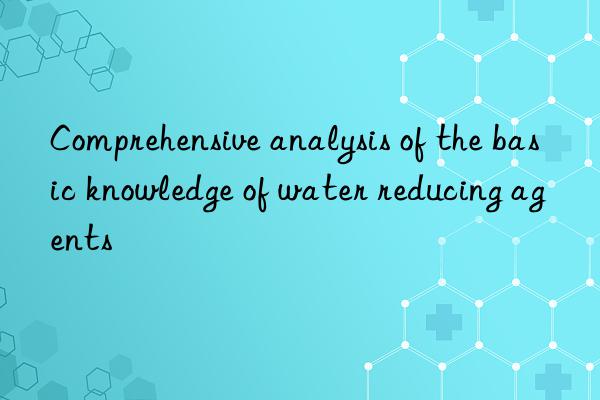
With the continuous advancement of technology in the construction industry, people's requirements for cement concrete are getting higher and higher. This is reflected in the fact that it not only requires concrete to have early strength, adjustable setting, large fluidity, high durability, light weight, etc., but also requires easy molding, low preparation cost, simple maintenance, etc. Concrete admixture is the sixth component of cement concrete besides cement, sand, stone, admixtures and water. Water reducing agent is the main raw material of modern building construction projects because of its high strength and long service life. It has been welcomed by the majority of practitioners due to its advantages such as long life. As construction projects develop towards high-rise, large load, large span, large volume, rapid, economical, energy-saving and green directions, water-reducing agents have become indispensable for modern concrete. During the concrete mixing process, it is necessary to add an appropriate amount of admixtures to improve the performance of the concrete. Adding high-quality admixtures has become a necessary technical way to prepare concrete. In addition to improving the quality of concrete and the level of construction technology, the application of different types of admixtures can play many important roles.
1. Product Introduction
The main chain of the water-reducing agent molecule is adsorbed on the surface of the cement particles, and the branch chains surround the cement particles, which has a steric hindrance effect on the cement particles, thus blocking temporary hydration. This is completely different from the mechanism of traditional water-reducing agents that disperse cement particles through electrostatic repulsion, and has achieved a qualitative leap in the application of high-strength concrete.
2. Scope of use
Suitable for all types of applications Cast-in-place, ready-mixed and pumped concrete in industrial and civil construction, water conservancy and hydropower, ports, transportation, municipal and other projects, especially in early strength, ultra-high strength, high impermeability, self-leveling and other special concrete, has excellent performance.
3. Characteristics and advantages of water reducing agent
The unique comb-like structure gives it the following advantages in the application performance of concrete:
1. It has high Water-reducing properties, even if added in a small amount, can show excellent water-reducing properties.
2. Excellent dispersion and self-compacting properties, super-fluid self-leveling concrete of different strength levels can be formulated.
3. It can greatly increase the early and late strength and improve the durability of concrete.
4. It has excellent slump sustainability and is suitable for long-distance transportation.
5. Good adaptability, good dispersion and plasticity for various types of cement and admixtures.
6. Reduce the carbonation rate, bleeding rate and shrinkage rate of concrete, and improve Creep performance.
7. No chlorine, no ammonia, low alkali, no "three wastes" emissions during the production process, it is a new generation of green environmentally friendly products.
IV. Usage methods and Notes
1. The commonly used dosage is 0.6∽1.5% of the cementitious material. When preparing high-strength concrete, the dosage can be increased to 2.5∽3%.
2. Not allowed When mixed with naphthalene series water reducing agent, experiments must be carried out when mixed with other types of admixtures.
3. Construction should be carried out in accordance with the relevant provisions of GB50119-2003 "Technical Specifications for the Application of Concrete Admixtures".
4. Packaging is in barrels, cans or tank trucks for transportation
5. The impact of water reducing agent on concrete
1) Affects the slump of concrete
Under normal circumstances, practitioners will mix a certain amount of water-reducing agent into concrete to increase the slump of concrete, which can effectively improve the workability of freshly mixed concrete.
2) The impact of too much water-reducing agent on concrete
Relevant construction standards stipulate that the amount of water-reducing agent in concrete should be 0.25% to 0.75%. However, Due to the influence of various adverse factors, the quality of the water-reducing agent mixed into concrete during the actual construction process often exceeds the standard, and the amount of water-reducing agent added exceeds the standard, especially if it is seriously exceeded, the consequences are very serious. Test data shows that when the mass of the water-reducing agent mixed into concrete exceeds the recommended mass by more than 1 times, the hardening and setting time of the concrete will be greatly extended, and the early strength of the concrete will not meet the design requirements. In some cases, the concrete Failure to solidify may also occur.
</p

 微信扫一扫打赏
微信扫一扫打赏

